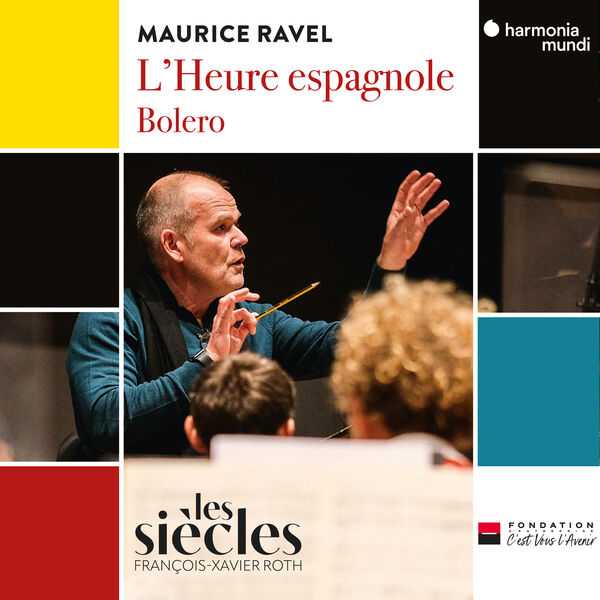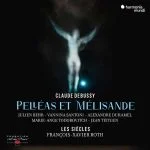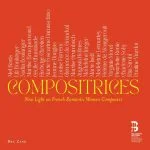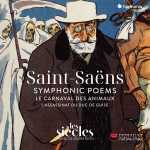

Composer: Maurice Ravel
Performer: Isabelle Druet, Julien Behr, Loïc Félix, Thomas Dolié, Jean Teitgen
Orchestra: Les Siècles
Conductor: François-Xavier Roth
Format: FLAC (tracks)
Label: Harmonia Mundi
Catalogue: HMM905361
Release: 2023
Size: 1.1 GB
Recovery: +3%
Scan: yes
L’heure Espagnole
01. Introduction
02. Señor Torquemada, horloger de Tolède ?(Ramiro, Torquemada)
03. Totor ! (Concepción, Torquemada, Ramiro)
04. II reste, voilà bien ma chance ! (Concepción, Ramiro)
05. II était temps, voici Gonzalve ! (Concepción, Gonzalve)
06. C’est fait, l’horloge est à sa place (Ramiro, Concepción, Gonzalve)
07. Maintenant pas de temps à perdre ! (Concepción, Gonzalve)
08. Salut à la belle horlogère ! (Iñigo, Concepción)
09. Voilà !.. Et maintenant à l’autre ! (Ramiro, Concepción, Iñigo)
10. Évidemment, elle me congédie (Iñigo)
11. Voilà ce que j’appelle une femme charmante (Ramiro)
12. Monsieur, ah ! Monsieur ! (Concepción, Ramiro)
13. Enfin, il part ! (Iñigo, Concepción)
14. Voilà l’objet ! (Ramiro, Concepción, Iñigo)
15. Ah ! Vous, n’est-ce pas, preste ! (Concepción, Gonzalve)
16. En dépit de cette inhumaine (Gonzalve)
17. Voilà ce que j’appelle une femme charmante ! (Ramiro, Concepción)
18. Oh ! La pitoyable aventure ! (Concepción, Gonzalve)
19. Voilà !… Et maintenant, Señora, je suis prêt (Ramiro, Concepción)
20. Mon œil anxieux interroge (Iñigo, Gonzalve)
21. Adieu, cellule, adieu, donjon (Gonzalve)
22. ll n’est, pour l’horloger, de joie égale (Torquemada, Iñigo, Gonzalve)
23. Pardieu, déménageur, vous venez à propos ! (Iñigo, Torquemada, Ramiro, Concepción, Gonzalve)
24. Un financier… (Gonzalve, Iñigo, Concepción, Torquemada)
25. Boléro
Continuing their exploration of Ravel’s output, François-Xavier Roth and Les Siècles offer us two works linked by his love of Spain.
Alongside the famous Bolero, which regains its original flavour here on period instruments, is Ravel’s first opera, which flirted with libertinism: though its outstanding cast consists entirely of native French-speakers, this caustic ‘Hour’ remains quintessentially Spanish.
The main attraction of the orchestra Les Siècles and its conductor François-Xavier Roth is its use of period instruments from around 1900, the time period in which the group specializes. One could hardly ask for a better demonstration record (as audiophiles used to call them) than this take on Maurice Ravel’s L’Heure espagnole, an edgy, rather tawdry but undeniably funny little opera about the extramarital escapades of a clockmaker’s wife, complete with excellent satirical characterizations of her two lovers. The opera receives a pitch-perfect performance here from a quintet of younger singers, who deliver the kind of dry, close-to-spoken singing Ravel wanted. Even better, though, is the orchestral sound, where the opera’s large contingent of winds, brass, and percussion displays the sound of Les Siècles at its most vivid. The score calls for trios of oboes, clarinets, and bassoons, and these all have a tangier sound than modern instruments provide. The program ends with Boléro, and this, too, stands out from among the hundreds or thousands of other recordings on the market. Ravel had very fixed ideas about how he wanted the work to sound, and he wrangled with Arturo Toscanini, who conducted the premiere in New York, about it: it should be played absolutely straight, with no variation in tempo and little expression. Notwithstanding the connotations that became attached to the work later on, he viewed it as an abstract work, and that is exactly what it becomes in Roth’s bracing reading. Listeners who have been wanting to sample Roth’s work with this orchestra are enthusiastically encouraged to try this release, which made classical best-seller charts in the summer of 2023.



